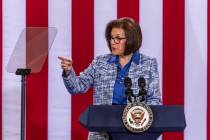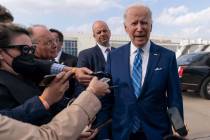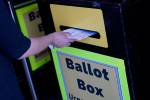A simple case of incumbent protection
It's difficult to recall elected officials, which is why it so rarely happens.
Indeed, it was meant to be difficult, because continuity in public policy would suffer if officials -- instead of serving established terms -- were being recalled from office willy nilly, every time they did something that displeased a temporary majority.
But it was never supposed to be impossible. In fact, back in 1970, Nevada voters changed the state constitution to make it easier.
Previously, Article 2, Section 9 had stipulated that to initiate a recall election, it was necessary to gather signatures from "twenty-five percent (25%) of the qualified electors who vote in the municipality electing said officer, at the preceding election ... "
Instead, voters approved an amendment stating the signatures be collected from "a number of registered voters not less than twenty-five percent (25%) of the number who actually voted in the state or in the county, district or municipality electing said officer ..."
The purpose was obvious. No election sees 100 percent turnout. In fact, in local elections, turnouts below 50 percent are the norm. Gathering signatures equal in number to 25 percent of those who were qualified to vote in the last election is a far more onerous task than gathering an amount of signatures equal in number to 25 percent of the voters who "actually voted" in that election.
Nor is the choice of the phrase "who actually voted" hard to understand. It's meant to differentiate from the more general "those who vote," which could be easily interpreted to mean "those who were qualified to vote." But the adjectival phrase still describes and defines "number." The purpose is not to name individuals, but to set a target number.
The intent of the voters was to make it easier to qualify a recall petition for the ballot, by requiring fewer signatures.
Enter with us now into the topsy-turvy, Bizarro Superman world of Democratic state Attorney General Catherine Cortez Masto.
What voters actually intended, the creative Ms. Cortez Masto has just discovered for the first time, 38 years later, was to require petition passers to obtain the signatures of 25 percent of the actual, named individuals who voted in that election.
In other words, under this new opinion -- which reverses all previous, sensible rulings on the topic -- if 76 percent of the actual, individual voters who voted in that election have moved away, it will do you no good to get the signatures even of 100 percent of the current registered voters on a recall petition, because you still won't have the signatures of 25 percent of the actual, individual citizens who voted in the election, only 24 percent of them still being available to wield a pen.
It's tempting to call this nonsense, but the word "nonsense" carries a hint of carefree, whimsical randomness. The willful violation of common sense here -- the pretense that a phrase meant to set the number of signatures required instead dictates which specific individuals must sign -- is not random, at all. It is far more willful and insidious than that.
This "interpretation" serves the undeniable purpose of incumbent protection, making it enormously harder to qualify a recall petition.
Voting laws should be interpreted as broadly as possible to protect the voters' rights. Instead, Ms. Cortez Masto, at the request of Secretary of State Ross Miller, now willfully interprets the law as broadly as possible in service of protecting incumbents from the inconvenience of recall elections, and as narrowly as possible when it comes to the interests of voters.
Which may explain what happened when we asked for a copy of this May 13 opinion. Ms. Cortez Masto's office wouldn't release it, saying this official work product was confidential between her office and that of her "client," Secretary of State Miller, who sought the ruling to back up a wrongheaded decision he'd already made in a Boulder City recall effort. (Mr. Miller's office quickly sent us the AG's opinion.)
Does that mean the taxpayers didn't pay her or her staff while they were working on this abomination -- that all the time they spent on this creative writing assignment was billed personally to Mr. Miller?
We didn't think so.























